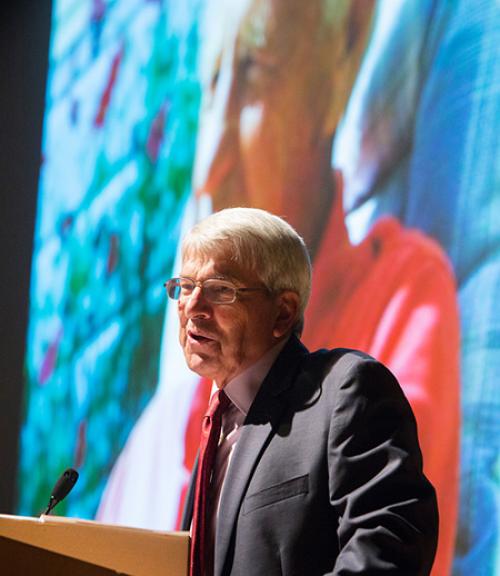A memorial celebration Sept. 12 in Statler Auditorium brought together much of what M.H. “Mike” Abrams cherished – poetry, Elizabethan music, family, friends and colleagues.
Abrams, who died in April at 102, was “one of the greatest professors in Cornell’s history and certainly one of its most beloved,” said Jonathan Culler, Abrams’ successor as the Class of 1916 Professor of English.
“Mike spent his entire career – all 70 years of it – at Cornell, proving by example that the best scholars make the best teachers and the other way around,” President Elizabeth Garrett said in her welcoming remarks. “Although Mike officially retired in 1983, he remained deeply engaged in the life of Cornell.”
“Unlike many of you here today, I knew Mike Abrams only through his work – a precious gift that he gave to the world,” she said. “He lives on here and throughout the world in the great body of work he has bequeathed to us, in the students that he taught, the colleagues that he mentored, and the example that he set of the ideal Cornell professor – warm, accessible, erudite; someone for whom teaching and the highest levels of scholarship were productively intertwined.”
Professor of English Paul Sawyer, who once taught alongside Abrams, said: “He was a wonderful teacher, partly because his understanding of literature was bound up with teaching in a very profound way. … In his lectures, which always included a reading, texts would emerge as things of wit and beauty and clarity.”
Andy Noel, director of Cornell athletics, said Abrams often rode the bus to the Big Red football team’s away games – and that over the years, “his attendance was perfect” at home games.
His daughters, Jane Ross Brennan and Judy Abrams, and granddaughter, Sarah Brennan, also offered memories.
“I suppose I knew he was a colossus in the area of literary studies,” Jane Brennan said. “At about 21, I discovered to my chagrin that I could hardly take him anywhere without him attracting attention.”
Geoffrey Harpham, who recently retired as director of the National Humanities Center, which Abrams helped found, recalled a day spent with Abrams and his comment on his first day in Ithaca: “‘When I saw the university and the city, I knew that there was no other place for me.’”
As a recorder ensemble played, images from Abrams’ life were shown – at Cornell football games; aboard the Queen Mary with his family; canoeing with his wife, Ruth; and with Barack and Michelle Obama (who autographed the photo) the day he received the National Humanities Medal at the White House in 2014.
Fellow poets and English faculty members Robert Morgan, Alice Fulton, Ishion Hutchinson, Joanie Mackowski and Professor Emeritus Kenneth McClane read some of Abrams’ favorite poems, by Shelley, Keats, Wordsworth, Tennyson and Emily Dickinson. The memorial celebration ended with a recording of Abrams reading the A.R. Ammons poem “Mansion.”
Many of the speakers returned to Abrams’ best-known work, as founding editor of “The Norton Anthology of English Literature” and general editor through seven editions (1962-2000).
“Surely nobody has brought more human beings together with more texts than Mike did in the Norton anthologies,” Sawyer said. “His view of literature was that it was fundamentally a process of human beings speaking to human beings across time and centuries.”
Julia Reidhead, editorial director at W.W. Norton, began working with Abrams in the early 1990s. “It was a May-December match – and I was December,” she said. “[The Norton Anthology] transformed the teaching of the survey course and became the way that many millions of students worldwide were introduced to the breadth of literature in English.” Norton’s president, Drake McFeely, once referred to the company as “‘the house that Mike built,’” she said.
Norton also prepared a slim volume for the event, “The Norton Anthology of M.H. Abrams,” edited by Roger Gilbert, professor and chair of English in the College of Arts and Sciences. It includes excerpts from Abrams’ senior thesis at Harvard in 1934 and his classic critical history of Romanticism, “The Mirror and the Lamp” (1953); the U.S. Navy Radio Phonetic Alphabet he helped develop in 1941; and a playful example of his parrying with Archie Ammons in verse.
This article originally appeared in the Cornell Chronicle.
Archived video of the event:




